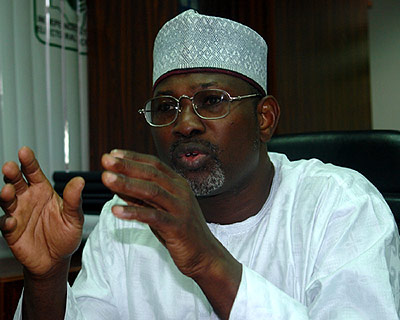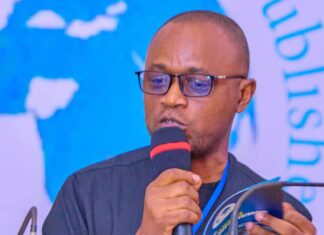Nigeria’s two main political parties, the Peoples Democratic Party (PDP) and the All Progressives Congress (APC), publicly presented their presidential candidates between December 8 and 10, 2014.

The period coincided with the International Human Rights Day, celebrated on December 10 every year since 1948 when the United Nations (UN) General Assembly ratified the Bill of Rights to which all member states subscribe.
But the extent to which the parties’ internal politics conform to the UN declaration will be seen in the days ahead as Nigerians await their campaign promises.
Politics
It looks clear that elections will hold in February 2015. If it happens it will defy predictions that President Goodluck Jonathan’s second term quest is fraught with danger. “Head or tail, Jonathan or any PDP aspirant will contest the 2015 general elections,” Musa Ibrahim, PDP youth leader, enthused last year.
There will be new governors and new faces in council, state, and federal legislatures.
Restiveness in the Niger Delta may resume if the result of the election fails to satisfy the region.
Cross carpeting, policy changes
However, it will be forlorn expectation to suppose that the elections will be without sore fallouts going by the precedents in the polity.
“Looking into the future, I can see that there is going to be a lot of cross carpeting by politicians because the primaries conducted in most states were not totally according to their various parties’ rules,” predicted Chris Banjo, a civil rights activist.
“There have been allegations of imposition and even outright stealing of other aspirants’ votes. There have been numerous such complains in all the primaries for all the various stages.
“So I expect that those who would not get a fair treatment from their present parties will, as usual, defect to other parties. They will inundate the courts with petitions, which is their trade mark.”
However, some of the more profound developments to expect this year are policy reversals if the PDP fails to coast home in the presidential vote. The APC has pledged to reverse government policies, especially those pertaining to refineries, war against corruption, insurgency, and upgrade other areas of “weak government”.
Chike Nwanze, a businessman said: “We all expect that a government that is not the present one in Abuja will attempt to reverse most of the economic policies of the present government. They have not hidden that.
“But I don’t know how they intend to go about that without drawing us back again because many foreign stakeholders’ money are involved in Nigeria’s economy. You don’t cancel agreements or MOUs (memorandums of understanding) with foreign entities arbitrarily without a backlash.
“I am only speaking as an economist, I am not a politician and I am not in the PDP.”
Boko Haram
Boko Haram can threaten a peaceful ballot in spite of military assurances. The National Assembly (NASS) has authorised Jonathan to use maximum force against the jihadists in the belief that it is better than declaring another state of emergency that has not solved the insurgency.
The state of emergency is subject to review after every three months, and the next one is in January or February 2015, the election period.
If the government falls further into the Boko Haram mess, Jonathan may be tempted to declare another state of emergency in insurgency-infested states since foreign nationals and diplomats will be in Nigeria as election observers and monitors, and there will be concern for their lives.
The only way to do that smoothly may be to stop election holding altogether, since that is the surest way to guarantee safety. Intensifying military campaign against Boko Haram may snowball into a magnitude that may equally mar the polls.
Cleaning up corruption
The war on corruption may receive more bite, no matter who wins the vote. Buhari is a famed anti-graft warrior. Jonathan seems to be methodical about it, opting for pressure and subtle threat to make people cough out stolen funds, as observed during the subsidy scam of 2012.
Jonathan may be bolstered by the fact that he has no other interest to keep, being in his last lap in office and may go the whole hug, even stepping on toes.
As for Buhari, if he wins, all the bad people in Nigeria are in trouble.
Foreign interest
Foreign interest will be refocused on Nigeria to see if it remains intact or breaks up. Vociferous volleys may come from ethnic nationalities such as the Movement for the Actualisation of the Sovereign State of Biafra (MASSOB), Niger Delta militants, O’odua Peoples Congress (OPC), Middle Belt Forum, Arewa Consultative Forum (ACF), and Ohanaeze Ndigbo, depending on the result of the election.
But there will also be intercession by Nigeria’s numerous men of God who will pray for the nation and admonish politicians.
INEC’s traditional hiccups
Precedents suggest that the Independent National Electoral Commission (INEC) may not perform to public acclaim.
“It baffles me,” said Cyril Nwankwo, a rights activist, “that upon all the money the INEC collects both from government allocation and Nigeria’s development partners, it cannot overcome logistics problems, thereby denying many people their right to vote.”
Economy
Nigerians will see a rise in the prices of consumer goods as the government’s belt-tightening measures take off. The Central Bank of Nigeria (CBN) is trying to control inflation and disposable cash will become scarce.
Politicians will latch on to the temporary austerity measures to make doubtful campaign promises. But they will come short of alternative workable plans, as counter campaign brickbats respond to opposition charges.
Fuel pump price may rise unofficially because, as Finance and Economy Coordinating Minister, Ngozi Okonjo-Iweala, put it, “the list of fuel importers are being pruned down.” Short supply may trigger pump price hike.
The naira will take a further plunge as the CBN tries to control foreign exchange (forex) to save its value. But this is likely to cause panic buying and stockpiling by banks and merchants which will later resell at high rates.
Positive notes
Some economic programmes will come on stream, even with the threat of underfunding. Nigeria will likely have its first indigenous refinery when Orient Refinery begins operation in the first quarter of the year.
Anambra State Governor, Willie Obiano, promised that last December when he visited the complex in Umuleri.
Orient Refinery is a multi-purpose oil and gas processing and refining entity packaged by local promoters and some South East states.
The project is expected to add pep to the quest for local content in the oil and gas sector and also address shortage of petroleum products in the South East. Orient has been drilling oil since 2010 when it was established.
Also expected to be completed are three new airport terminals and the East-West road connecting the Niger Delta and the South West, among 10 upscale federal roads.
Business, commerce
Some policies enunciated by the government have provoked murmuring in the private sector. Interest group demands and phantom strikes may occur in 2015.
What is certain is that former Power Holding Company of Nigeria (PHCN) staff will make noise for their benefits to be paid.
Oil workers may go on strike as the government prunes the number of fuel importers. Banks will get more cautious in lending because of monetary squeeze as crude oil price fall means reduced government deposits from which most banks build their vaults.
The price of imported cars will continue to rise as the value of the naira falls. The government’s new auto policy in favour of local manufacturers may push demand for home-made vehicles.
The price of aviation fuel and cost of forex will push up air fares and D-Checks for aircraft fleets will impact the sector.
But, on the ground, there is a glimmer of hope for the rail system as the implementation of most MOUs will begin this year.
Miscellaneous occurrences likely
The resolutions of the national conference last year may resurface in the public domain in 2015 depending on the result of the election and the social temperature it generates.
“If the nation gets so silly after the election, I guess the next thing would be to resume the national confab where we stopped. Even then the confab has not completed its job in the real sense of the word,” explained Timi Ekaimo, a political analyst.
Geoffrey Udo, a member of the PDP, added: “They say Jonathan is not fighting corruption because he is not dumping every dick and harry into prison without trial. Let him win the 2015 election and we will see if he knows how to fight corruption or not.”
The media will continue to suffer in a hostile business environment; the cost of imputes may push many into extinction.Those established for pure political purposes will transform or change ownership in order to survive.
Publishing will witness a new cutting edge in the use of more PCs and other mobile devices, just as Nigerians will learn to buy set-up boxes, not just boxes for television signal reception.
Nollywood and the general entertainment sector will boom as the operators savour the N3 billion government intervention.
Electricity generating companies (gencos) and distribution companies (discos) may have their licences withdrawn by the government which has threatened several times to do so because of their failure to improve power supply.
“People who bought the gencos and discos are politicians. They have been playing politics with power supply. They don’t want to put money in the businesses they bought. That is bad,” lamented Chuks Udofia, an electricity engineer.
There may be new health epidemics to combat, but the facilities used to contain Ebola in 2014 are all still in place to check any emergency disease outbreak.













